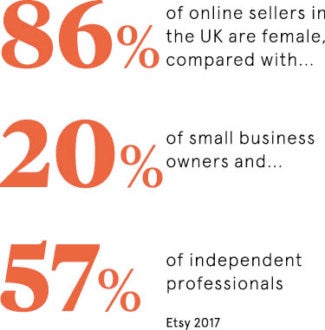As many as 86 per cent of online sellers in the UK are women, according to global marketplace Etsy’s UK Seller Census. However, as Tania Clark at IP firm Withers & Rogers points out, these businesses are among those least likely to own IP rights.
 Ms Clark thinks it is possible that the women behind these micro businesses view IP ownership as too costly. “But they could lose out in the long run if their designs or inventions are copied by larger competitors,” she warns.
Ms Clark thinks it is possible that the women behind these micro businesses view IP ownership as too costly. “But they could lose out in the long run if their designs or inventions are copied by larger competitors,” she warns.
This increase in female entrepreneurship is a positive trend, enriching the world of work and creating flexible working opportunities for many women with children. Such businesses are often internet based, making use of the rise of social channels such as Etsy and Pinterest to advertise and sell.
They could lose out in the long run if their designs or inventions are copied by larger competitors
“In these cases, it is important for entrepreneurs to take brand matters seriously from the start, protecting their logos and corporate identities with trademark registrations and patents. If they fail to do this, they could lose out commercially,” says Ms Clark.
There are likely to be just as many women working in branding and creative agencies that design logos and slogans for companies of all shapes and sizes, says Rachael Barber, IP partner at Kemp Little.
She says: “I am not convinced there is an industry or trade that suffers from a lack of innovation – it’s how it’s protected that makes them differ.
“Examining design and copyright laws is very important. Take the fashion industry, for example. Stella McCartney, Charlotte Olympia, Coco Chanel, Vivienne Westwood, Sarah Burton at Alexander McQueen, Sandra Choi at Jimmy Choo – all these woman create IP just as often, but they create things protected by design rights or copyright rather than patents.”
The fashion industry revolves around new and original designs, with companies investing significantly. As a fashion designer, if your IP is protected, you’re in a position to license the design to other companies in exchange for royalties.
You will be able to enter into commercial collaborations using your IP in conjunction with another label, brand or retailer. You’ll be able to prevent other companies from damaging your label’s reputation by copying your designs and it also makes you a more attractive investment proposition as a small business.
If a fashion designer has not registered a trademark, the greater the risk of someone else registering it in other countries, the consequences of which could be significant.
And it works both ways. Even subconscious derivation, where the infringer does not consciously realise they are copying an existing design, can result in copyright infringement.

